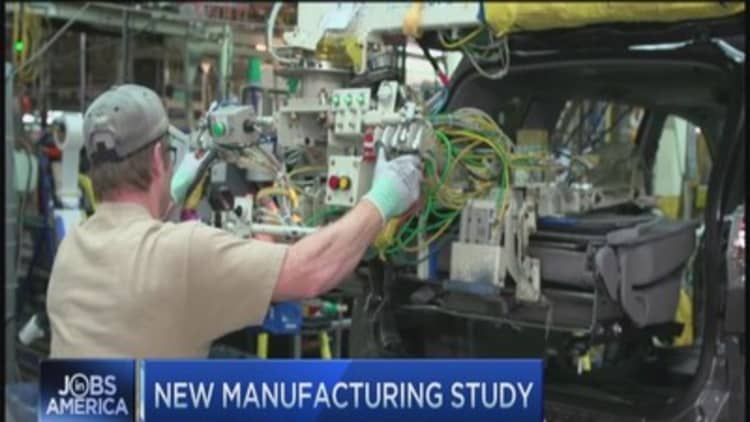
One of the most encouraging aspects of the U.S. economic recovery is the halo effect on manufacturing, which accounts for 1 in 6 private-sector jobs. Yet a new study is dismissing that renaissance as little more than a "myth."
The report by the nonpartisan Information Technology and Innovation Foundation, a Washington-based think tank, asserts that the sector's growth has been fueled in part by free trade advocates and government statistics that mask a sharp decline in manufacturing activity since 2000. The foundation says manufacturing's recovery has been merely tepid since the Great Recession ended in 2009.
"American manufacturing has still not recovered to 2007 output or employment levels," the study says.
"Moreover, the lion's share of growth that has occurred appears to have been driven by a cyclical, rather than structural, recovery, and as such may represent only a temporary trend."
The report flies in the face of what many analysts consider a broad-based recovery in manufacturing, jump-started in large part by booming U.S. oil and gas production.
Indeed, in the latest quarterly survey of employers by the National Association of Manufacturers and Industry Week, 91.2 percent of the respondents said they were upbeat about their company's outlook—only the fourth time in nearly 20 years that figure has topped 91 percent.
Additionally, as CNBC reported last month in the series "Rust Belt Rebound," officials and business leaders in recession-ravaged Ohio have been touting an economic resurgence.
Unemployment—which stood at 10 percent or higher for more than a year—is now below the national average.
The foundation, however, says the recent job gains barely make a dent in what it calls the "unprecedented" decline in U.S. manufacturing since 2000. The result is a sector still hobbled by high effective corporate tax rates and limited public investment in research, development and job training.

Even with the recent improvement, the study says the U.S. has lost roughly 1 million manufacturing jobs and 15,000 manufacturing establishments since 2000. Trouble in the sector goes even deeper than that, the study says.
Since 2000, the only real growth in U.S. manufacturing output as measured by the U.S. Bureau of Economic Analysis has been in computers and electronic components, the study says, a sector that is "seriously overstated as a result of the very rapid rate of progress in computer processing speeds."
Without computer production, durable goods manufacturing actually declined by nearly 10 percent between 2000 and 2009, according to the foundation. Even non-long-term goods, which include most of the manufacturing related to the nation's energy boom, have underperformed overall economic growth, the study says.
As for manufacturing job gains since the 2007-2009 recession, the study notes that while they have been more robust than in the prior three recoveries, they are still barely on par with historical averages.
The depth of the job losses in the most recent downturn makes the recovery weak, according to the foundation.
The report accuses free trade advocates of pushing the narrative of a manufacturing rebound despite the evidence to the contrary.
"They fear that an accurate portrayal of U.S. manufacturing will result not in a robust U.S. manufacturing strategy but in trade protectionism," the authors write. As a result, the report warns that policymakers and business leaders are being lulled into complacency.
"To realistically assess our options, it is important to have a clear idea of where we are," the report said.


